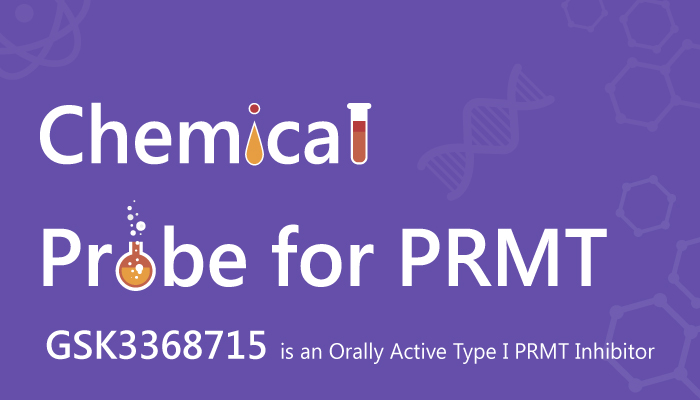GSK3368715 is an orally active type I PRMT inhibitor.
Protein arginine methyltransferases (PRMTs) transfer a methyl group from S-adenosyl-L-methionine (SAM) to the substrate arginine side chain. All PRMTs can generate ω-NG-monomethyl-arginine (MMA) through a single methylation event. However, type I and II enzymes catalyze progression from MMA to NG-asymmetric dimethyl arginine (ADMA) and ω-NG,N’G-symmetric dimethyl arginine (SDMA), respectively. In numerous solid and hematopoietic cancers, type I PRMTs is overexpression. Moreover, type I PRMTs can contribute to transformation, proliferation, invasiveness, and survival of cancer cells, through methylation of arginine residues. Meanwhile, other PRMTs, including the major catalyst of SDMA, PRMT5, have been implicated in cancer biology.
GSK3368715 is a first-in-class, orally active, reversible, and S-adenosyl-L-methionine (SAM) uncompetitive PRMT 1 inhibitor.
GSK3368715 exhibited IC50s of 3.1 nM, 48 nM, 1148 nM, 5.7 nM , 1.7 nM for PRMT1, PRMT3, PRMT4, PRMT6, PRMT8, respectively. In addition, GSK3368715 produces a shift in arginine methylation states on hundreds of substrates from ADMA to MMA and SDMA.

In vitro, the authors test the anti-proliferative activity of GSK3368715 in 249 cancer cell lines, representing 12 tumor types. The majority of the cell lines showed 50% or more growth inhibition by GSK3368715. On the other hand, the Toledo DLBCL cell line has a cytotoxic response to GSK3368715 with a gIC50 of 59 nM. GSK3368715 induces time- and dose-dependent accumulation of DLBCL cells in sub-G1. In contrast, the cytostatic OCI-Ly1 line accumulation of sub-G1 only detects at the highest concentration of GSK3368715.
In vivo, GSK3368715 can completely inhibit tumor growth or cause regressions of tumor models. It induces dose-dependent inhibition of Toledo tumor growth, with tumor regression in mice treated with >75 mg/kg. Moreover, GSK3368715 has significant effects on the growth of BxPC3 xenografts at all doses. It reduces tumor growth by 78% and 97% in the 150- and 300-mg/kg dose groups, respectively. At 150 mg/kg GSK3368715 in cell line xenograft models of clear cell renal carcinoma and triple-negative breast cancer reveals tumor growth inhibition of 98% and 85%, respectively. Futhermore, in a patient-derived xenograft model of pancreatic adenocarcinoma, GSK3368715 has significant effects on tumor growth, with inhibition >90% in a subset of animals within the 300-mg/kg cohort.
In summary, GSK3368715 reveals robust synergistic anti-proliferative effects and attenuation of all forms of arginine methylation. The safety and efficacy of GSK3368715, together with the utility of MTAP status as a patient selection biomarker, are currently under clinical investigation.
Reference:
Fedoriw A, et al. 2019 Jul 8;36(1):100-114.e25.